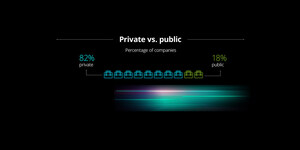NEW YORK, May 7, 2019 /PRNewswire/ -- Blockchain investment continues to surge as new, practical business applications gain traction and business leaders begin to see beyond the "hype cycle," according to Deloitte's "2019 Global Blockchain Survey," released today. While blockchain implementation continues to increase across financial services, its transformational importance is gaining momentum across multiple sectors, including technology, life sciences, media, telecommunications and government. The survey reveals that executives see blockchain as a more mature solution, while they're taking pragmatic approaches toward investments and adoption.
Eighty-three percent of the 2019 blockchain-savvy survey respondents cite that their organizations see compelling use cases for blockchain, and more than half (53%) reported that blockchain technology has become a critical priority for their organization this year — a 10 percentage point increase over last year. This momentum is translating into action, with 40% reporting that they are willing to invest US$5 million or more in new blockchain initiatives over the next 12 months.
Moving from 'will it work' to 'what will it disrupt'
More organizations across a wider variety of sectors are expanding and diversifying their blockchain initiatives. This is occurring even as uncertainty remains about having the talent, strategic vision and experience to adopt blockchain solutions and fully realize the technology's benefits. Overall, survey respondents pointed to more diverse advantages than in 2018. For example, there was a 12 percentage point increase in those planning to replace current systems of record with blockchain — which demonstrates the technology's increasing maturity.
"The tone and terms of the debates around blockchain are shifting, according to this year's study, incorporating more use cases and strategic visions of the future," said Linda Pawczuk, principal, Deloitte Consulting LLP and U.S. blockchain leader. "As the blockchain story continues to mature and begins a new chapter, we believe the question for executives is no longer 'Will the technology work?'; but, 'How can we make this technology work for us?'"
Moving to application: enterprise companies and emerging disruptors unleash blockchain's potential
In addition to surveying enterprise respondents, Deloitte targeted a sample of emerging disruptors — leaders at companies who built their business models around the technology. With more familiarity, emerging disruptors are leveraging blockchain to reinvent business models and reduce friction across organizations:
- Emerging disruptors overwhelmingly cite business models and value chains (42%) as the most significant advantage of blockchain, whereas enterprise respondents were equally split between security/lower risk and business models/value chains (23% for both).
- In fact, 71% of enterprise organizations believe that blockchain provides greater security than conventional information technology solutions, while only 48% of emerging disruptors feel the same.
- When asked, 4 in 5 emerging disruptors expect to see results from blockchain implementations within three years, as opposed to 3 in 5 enterprise responders.
- When asked about barriers to adoption, enterprise organizations had little consensus. In contrast, emerging disruptors overwhelmingly (71%) chose regulatory issues as the greatest barrier to blockchain adoption.
Talent, strategic and other concerns remain
While the perception of blockchain is shifting on a global scale and it continues to gain traction and acceptance across a growing number of industries, enterprise and emerging disruptor executives are approaching blockchain with caution and a measure of skepticism:
- The number of respondents who see blockchain as overhyped grew from 39% last year to 43%.
- Most respondents list blockchain as a top-five priority, yet just 23% expect to initiate new blockchain deployments in the next year, a decline from 34% in 2018.
- Talent remains a concern for organizations, as 28% — the same as in 2018 — cited lack of skills or "in-house capabilities" as a barrier to success.
China, other countries globally see increasing practical utility from blockchain
Just as emerging disruptors are changing the dynamics of the industries and sectors in which they compete, new blockchain initiatives in different countries and regions are affecting how blockchain is implemented around the world. The survey profiles the drivers and attitudes that affect blockchain development in China, Singapore and Israel, which can serve as guides for organizations that are looking to do business with global partners and show how innovation is informed by context. Key findings include:
- In China, 73% of survey respondents said blockchain is a top-five strategic priority, a figure substantially higher than most other countries.
- More than half of survey respondents in China and Singapore are currently hiring blockchain staff.
- Most respondents from China, Singapore and Israel say they need to see a return on blockchain investment within three years.
Blockchain consortia continue to demonstrate robust interest across sectors
The survey further explores attitudes toward blockchain consortia, as businesses in a variety of industries continue to join and explore the consortium model to develop blockchain applications, share expertise, and catalyze the broader blockchain ecosystem. The overwhelming majority of respondents (92%) either belong to a consortium or plan to join one in the next 12 months. Respondents cited alignment on objectives (41%), quality and stature of other members (37%), and opportunity for influence (36%) as primary criteria for joining a consortium. The majority expect cost savings (57%) and accelerated learning (55%), indicating that blockchain consortia still have an important role to play as blockchain technology matures and practical applications begin to make their impacts felt across businesses. While consortia present challenges for blockchain practitioners — including intellectual property concerns; funding uncertainty; and business, technology and regulatory risk factors — they will continue to figure in the blockchain landscape.
Executives have begun to ask challenging, granular, and increasingly pragmatic questions about blockchain technology that demonstrate an emerging awareness of its evolution. Blockchain technology works. Now, executives must figure out how to make it work for "their" businesses, how to make the most of disruptive innovation in the space, and how to align within the entire blockchain ecosystem as it begins a new chapter.
"It's critical for organizations to ask the questions that will help discern blockchain's real value from myth and hype. We're still in early stages of discovery for blockchain, and there are blind spots to explore as well as benefits," said Rob Massey, partner and global blockchain leader for Deloitte Tax LLP. "At Deloitte we're committed to helping organizations of all sizes and sectors navigate the enormous market opportunities and risks that blockchain presents."
The survey was conducted from early February to early March 2019 and polled a sample of nearly 1,400 senior executives in 12 countries. To access the full report, visit: 2019 Global Blockchain Survey.
Deloitte to present findings at Consensus 2019 event
A panel of Deloitte blockchain executives will present the survey's findings at Consensus 2019, Monday, May 15, at 11:20 a.m. EDT. The panel, "Getting Down to Business in Blockchain," will showcase Deloitte's approach to blockchain, which it sees as a multidimensional set of risks and opportunities across innovation, business model disruption, tax, audit, regulatory, security and privacy concerns.
About Deloitte
Deloitte provides industry-leading audit, consulting, tax and advisory services to many of the world's most admired brands, including nearly 90% of the Fortune 500 and more than 5,000 private and middle market companies. Our people work across the industry sectors that drive and shape today's marketplace to make an impact that matters — delivering measurable and lasting results that help reinforce public trust in our capital markets, inspire clients to see challenges as opportunities to transform and thrive, and help lead the way toward a stronger economy and a healthy society. Deloitte is proud to be part of the largest global professional services network serving our clients in the markets that are most important to them.
Deloitte refers to one or more of Deloitte Touche Tohmatsu Limited, a UK private company limited by guarantee ("DTTL"), its network of member firms, and their related entities. DTTL and each of its member firms are legally separate and independent entities. DTTL (also referred to as "Deloitte Global") does not provide services to clients. In the United States, Deloitte refers to one or more of the US member firms of DTTL, their related entities that operate using the "Deloitte" name in the United States and their respective affiliates. Certain services may not be available to attest clients under the rules and regulations of public accounting. Please see www.deloitte.com/about to learn more about our global network of member firms.
SOURCE Deloitte

Related Links
WANT YOUR COMPANY'S NEWS FEATURED ON PRNEWSWIRE.COM?
Newsrooms &
Influencers
Digital Media
Outlets
Journalists
Opted In





Share this article